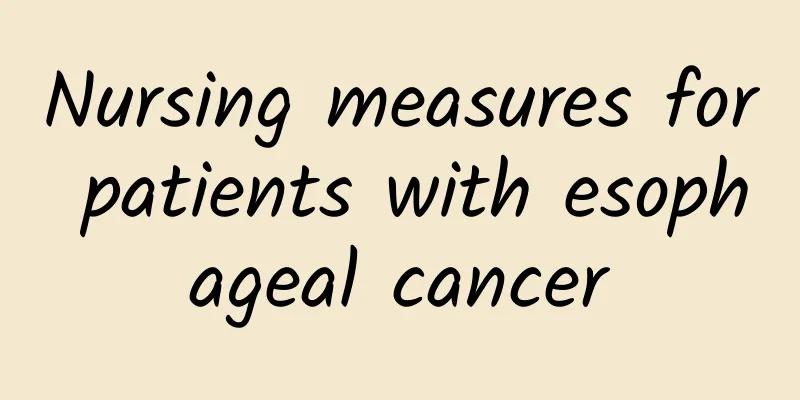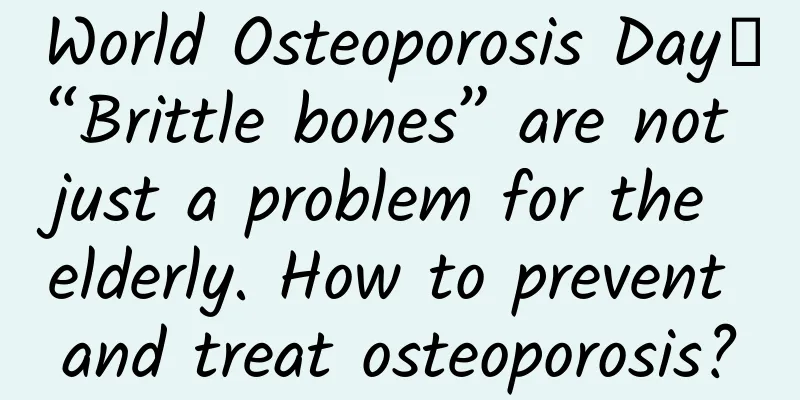Nursing measures for patients with esophageal cancer

|
In the long river of life, some journeys are destined to be turbulent, and esophageal cancer is that sudden "huge wave". Faced with such a challenge, patients not only need professional treatment from doctors, but also careful care from family members and caregivers. Esophageal cancer is a common malignant tumor that has a serious impact on the life and health of patients. Comprehensive care measures can help patients alleviate symptoms, improve quality of life, and promote treatment effects. So, how do caregivers care for patients with esophageal cancer? Let's take a look today. 1. Preoperative care First of all, patients with esophageal cancer have progressive dysphagia and poor tolerance to surgery, so they usually have a certain resistance and fear of surgery. Nurses should calm patients' emotions, help them relieve tension, increase their confidence, and face surgery positively. Secondly, good preoperative nutritional status is crucial to the success of surgery and postoperative recovery. If patients are malnourished, the risk of surgery and the incidence of postoperative complications may increase. Nurses should work with nutritionists to develop personalized nutrition plans to ensure that patients receive adequate nutritional support before surgery. Before surgery, nurses should assist patients in completing all necessary preoperative examinations and preparations, including blood tests, electrocardiograms, chest X-rays, etc. At the same time, ensure that patients understand the process, risks, and possible complications of the operation. For those who can eat normally, they should be given a high-calorie, high-protein, high-vitamin liquid or semi-liquid diet to maintain a good nutritional status. For those who cannot eat, water, electrolytes and calories should be supplemented intravenously to ensure that the body can maintain a good nutritional status before surgery. Special attention should be paid to oral hygiene before surgery. For patients who need preoperative gastrointestinal preparation, a gastric tube and duodenal drip tube should be placed before surgery to empty the gastrointestinal contents and reduce contamination and complications during surgery. Fasting before surgery can reduce the reflux of gastric contents during surgery and reduce the occurrence of postoperative complications. For patients who are scheduled to undergo colon esophageal replacement surgery, colon surgery preparation care should be followed before surgery to ensure that the intestines are clean and well prepared before surgery. 2. Postoperative Care The primary task of postoperative care is to closely observe the patient's vital signs and changes in condition, including blood pressure, heart rate, respiration, body temperature, etc., and to promptly detect and deal with possible complications or infections. Strictly fasting and drinking water should be prohibited after surgery. During the fasting period, intravenous fluids are replenished daily. Two days after the operation, the patient's intestinal motility gradually recovers, and nutrient solution is dripped through the catheter to reduce the amount of infusion. On the fifth day after the operation, the patient's diet is gradually restored according to the doctor's instructions, and the patient begins to gradually transition from liquid food to soft food and ordinary food. Nutritionists should develop personalized diet plans to ensure that patients receive adequate nutritional support. Anastomotic leakage refers to an abnormal passage at the connection between the esophagus and the stomach or intestine after surgery, which causes food and liquid to enter the chest or abdominal cavity, causing infection and other serious consequences. Therefore, it is very important to observe the symptoms of anastomotic leakage for the care of patients with esophageal cancer. If the patient has symptoms such as high fever and chills, it may be due to infection caused by anastomotic leakage. At this time, the doctor should be notified in time for treatment. It is also necessary to pay attention to the patient's diet. If the patient has symptoms such as difficulty eating and choking, it may be due to food entering the respiratory tract due to anastomotic leakage. The commonly used treatment method is total enteral nutrition (TEN), which is treated by gastrostomy feeding, and the effect is definite. Patients with esophageal cancer may need closed chest drainage after surgery to eliminate pleural effusion and prevent complications such as pleural infection and pneumothorax. Before performing closed chest drainage, the nursing staff should check the doctor's orders to confirm the indications and methods of drainage. At the same time, prepare the required drainage equipment, disinfection equipment, saline and other items. Change the dressings of the drainage site regularly to keep the drainage site clean and dry to prevent skin infection and pressure sores. According to the situation of the drainage fluid, the bloody fluid drained out generally becomes lighter and the amount decreases 2 to 3 days after surgery. When the 24-hour volume is less than 50 ml, extubation can be considered. However, the timing of extubation still requires a comprehensive evaluation by the doctor to ensure that the patient's chest condition is stable and there are no complications, so as to avoid problems caused by removing the drainage tube too early or too late. Regarding the care of gastrointestinal decompression, if the gastric tube is not unobstructed, it should be handled in time to avoid the increase of anastomotic tension and the occurrence of anastomotic fistula. You can try to flush the gastric tube with a small amount of normal saline and withdraw it in time to remove the obstructing material. At the same time, closely observe the patient's condition to prevent complications. If the gastric tube is dislocated, do not insert it again blindly to avoid serious problems such as anastomotic fistula. The medical staff should be notified immediately and handled according to the doctor's orders. The time to remove the gastric tube is generally 3 to 4 days after surgery. It is necessary to wait for the anus to be exhausted and the gastrointestinal decompression drainage volume to decrease to ensure that the patient's condition is stable to avoid complications. This article briefly introduces several nursing measures for patients with esophageal cancer. We believe that comprehensive and meticulous care can help patients better cope with esophageal cancer, improve treatment outcomes, and enhance their quality of life. The views in this article are for reference only. Not all patients are exactly the same, so individual factors should be considered when developing a nursing plan. Author: Liu Xinxia, Lingshou County People's Hospital, Shijiazhuang City, Hebei Province |
<<: What are the nursing measures for uterine fibroids?
>>: Be alert to the attack of breast cancer and take precautions in advance
Recommend
The dangers of functional uterine bleeding
In our country, red represents passion and happin...
Drinking a cup of milk tea can result in trillions of plastic particles being consumed?
When you enjoy a cup of hot coffee or hot milk te...
Pregnant and lazy to give birth to a boy or a girl
During pregnancy, women will experience many symp...
What is the reason for women's excessive vaginal discharge?
Secretion is a friend that women are more familia...
This part of the chicken should never be eaten! Most people don't know...
Chicken has high nutritional value and is cheap, ...
40 days after medical abortion, brown discharge
Abortion is relatively unfamiliar to many women, ...
Hot search! These 6 types of people should pay special attention
recent As the number of fever clinics increases n...
Can the baby be seen by family members after induced abortion?
Many mothers will choose induced abortion due to ...
How long does it take to get a normal period when breastfeeding?
Generally speaking, women will resume their ovula...
Girls' one-shoulder training method
Whether men or women, they all hope to maintain a...
Will anal fistula recur after surgery?
The prevalence of anorectal diseases caused by an...
Early clinical manifestations of vulvar leukoplakia
When you feel unwell, you cannot choose a treatme...
Pain when pressing on the edge of the breast during lactation
During sexual intercourse, breasts can increase t...
What to eat to nourish the body after miscarriage
Miscarriage is abortion. Women who experience var...









